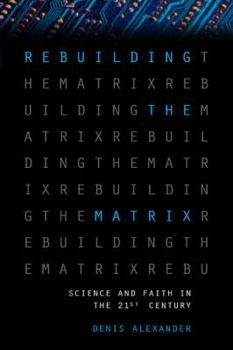Rebuilding the Matrix: Science and Faith in the 21st Century
Select Format
Select Condition 
Book Overview
A thorough and authoritative review by a practising scientist of one of the West's key debates over the last century and a half - do science and religion conflict, or can they go hand in hand?... This description may be from another edition of this product.
Format:Hardcover
Language:English
ISBN:0310250188
ISBN13:9780310250180
Release Date:April 2003
Publisher:Zondervan
Length:512 Pages
Weight:2.00 lbs.
Dimensions:9.5" x 1.6" x 6.4"
Customer Reviews
3 ratings
The fear of the Lord is the beginning of wisdom
Published by Thriftbooks.com User , 19 years ago
This book is by far the best introduction to a Christian scientific worldview. The author weaves together philosophy of science, history, the scientific literature in evolutionary biology and neuroscience, theology and sociology to mount a compelling case for a theistic 'matrix' for science. This is not your usual 'science and religion need not be at odds' homily. Alexander wants to rehabilitate the context within which science first flourished, namely Christian theism. The chapters on history are fascinating, while Alexander's critique of evolutionary naturalism, focusing on morality in an evolutionary context, is one of the most balanced and scientifically rigorous I have ever seen (unlike the politically motivated attacks of the like of Lewontin, Gould, et al.). Far away from the heat and dust generated by the futile Intelligent Design debate, in Darwin's homeland, orthodox Christian scholars work passionately in science for the glory of God. In a way it is the Christian equivalent of E.O. Wilson's "Consilience", and even more convincing. A must read.
intro to how science and religion do/ought to interact
Published by Thriftbooks.com User , 21 years ago
A 6 star book on a 5 star rating system, truely one of those must read now type of books. Not just for those interested in the immediate topic of how do science and religion interact, but those interested in how scientists can use their training to illuminate topics outside their field with both caution and great value. In many interesting ways it is like another book i greatly appreciated _Modern Physics, Ancient Faith_. One of the striking parallels is the type of person that wrote each, the intensity of their desire to communicate their insights to the general public, the book as a long term work of love, and their use of science as a support for their theological viewpoints while very conscious of science's limitations in the discussion.Pick up the book, unlike most books you can start reading almost anywhere to get an idea of the writing and topic. It is written to a generally educated audience, avoids jargon, shows evidence that it was written over a long time, i suspect 15-20 years as a passion outside of the author's professional life. It is remarkably evenly written, the only chapter i saw dipping in intensity or interest was 11="Determined to Love?: A Critique of Evolutionary Naturalism'. It is a rebuttal of M.Ruse's _Taking Darwin Seriously_ and its sociobiological/evolutionary psychology viewpoint.The first part of the book, culminating in an excellent motif in chapter 7="The Warfare Mechants: The Roots of Modern Science (4)- Darwin, Evolution and the Victorian Conflict Thesis", is a historical introduction to the topic of how science and theology/religion have interacted in Western history. IMHO, he has hit all the important peaks in the discussion and dwells on the issues that are really important. These chapters alone are worth the effort to read and understand what he is saying, plus they really illustrate the author's committment to truth, both in its ethical and historical dimensions. Debunking such issues as flat earth and the conflict thesis in the late 1900's.The chapters 8="Reweaving the Rainbow: Scientific Knowledge and Religious Knowledge", 9=headquarters Nights: Creation and Evolution" and 10="The Fox and the Hedgehog: Does Evolution have any Religious Implications" are the heart of the book. The technic is historical and follows the great discussions as people try to unwind their world and life view and interact with the issues in their culture and society. He has a very good grasp of the literature but what makes the arguments both interesting and significant is that he brings an organizational talent to the discussion that breaks up and prioritizes the pieces in a unique and valuable way. You can see that he has this book point: science and religion share a common world but they do not divide it up either mutually exclusively but with some overlap, nor mutually exhaustively. But to get us to where he is, takes knowledge by adding to our's and unlearning many false things that have become 'common wisdom' although they a
A Useful Book
Published by Thriftbooks.com User , 22 years ago
Why is there order in the universe?And why is this order comprehensibleor discoverable at all, even if, in part?What are the implications of a comprehensiveorder in the universe?As noted in this book,the theistic framework of Christianityis helpful.





